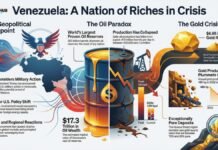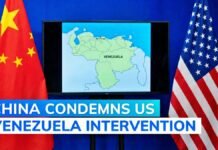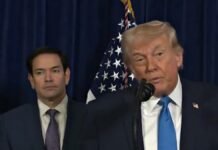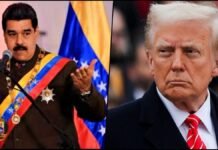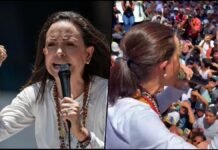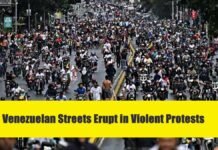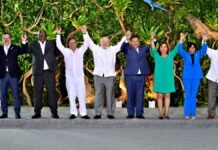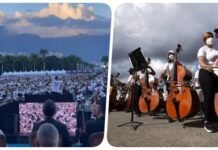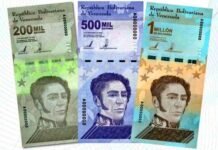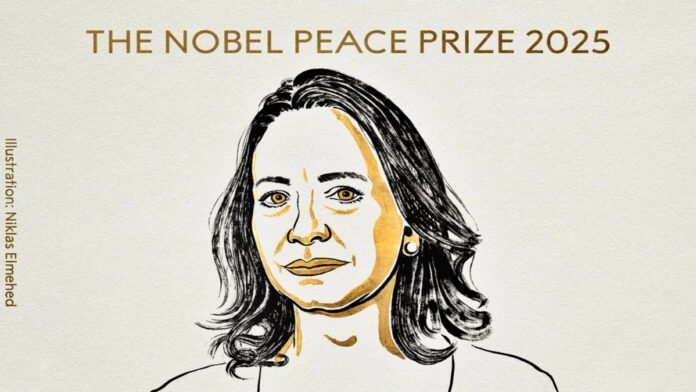
Key Points
- Maria Corina Machado wins 2025 Nobel Peace Prize for promoting democratic rights in Venezuela
- Award recognizes her courageous struggle against authoritarian Maduro regime
- Machado honored for leading peaceful transition efforts from dictatorship to democracy
- Venezuelan opposition leader has faced persecution, bans, and threats for political activism
- Prize highlights international concern over Venezuela’s humanitarian and political crisis
- Machado’s victory represents global recognition of Venezuela’s pro-democracy movement
- Award comes amid ongoing political repression and economic collapse in Venezuela
- Nobel Committee emphasizes importance of non-violent resistance and democratic values
- Recognition expected to amplify international pressure on Maduro government
- Machado joins legacy of Latin American democracy advocates honored with Nobel Peace Prize
New Delhi: The Norwegian Nobel Committee has awarded the prestigious 2025 Nobel Peace Prize to Maria Corina Machado, the courageous Venezuelan opposition leader whose unwavering commitment to democratic principles and human rights has made her a symbol of resistance against authoritarianism in Latin America. The award recognizes Machado’s tireless and often dangerous work promoting democratic rights for the Venezuelan people and her sustained struggle to achieve a just and peaceful transition from dictatorship to democracy.
A Champion of Venezuelan Democracy
Maria Corina Machado has emerged as one of the most prominent and fearless voices advocating for democratic restoration in Venezuela, a nation that has suffered under increasingly authoritarian rule, economic collapse, and a devastating humanitarian crisis. Her selection for the Nobel Peace Prize represents international recognition of both her personal courage and the broader Venezuelan pro-democracy movement’s struggle against oppression.
The Nobel Committee’s decision highlights Machado’s consistent dedication to non-violent political activism despite facing severe persecution, including political bans, arbitrary detention threats, harassment of family members, and potential physical danger. Her willingness to continue fighting for democratic principles in the face of such intimidation exemplifies the qualities the Peace Prize seeks to honor.
Venezuela’s Democratic Crisis
Venezuela has transformed from one of Latin America’s wealthiest nations into a country plagued by hyperinflation, food shortages, collapsed public services, and mass emigration. Over seven million Venezuelans have fled the country in recent years, creating one of the world’s largest refugee crises. The nation’s decline accelerated under the governance of Nicolás Maduro, whose government has been widely accused of authoritarian practices including rigging elections, suppressing opposition, controlling media, and violating human rights.
Machado has been at the forefront of efforts to challenge this authoritarian drift and restore democratic governance through peaceful means. She has organized opposition movements, led protests, coordinated international advocacy, and worked to unite Venezuela’s fractured opposition forces around common democratic goals.
Political Background and Activism
Maria Corina Machado first entered Venezuelan politics as an advocate for civil society and democratic institutions. She founded Súmate, a civil organization dedicated to promoting citizen participation in democratic processes and ensuring electoral transparency. Her activism brought her into direct conflict with the government, which has repeatedly attempted to silence her voice through legal harassment and political persecution.
Despite facing a government-imposed ban preventing her from holding public office, Machado has continued organizing opposition efforts and building coalitions aimed at achieving peaceful democratic transition. Her leadership has inspired millions of Venezuelans both within the country and in diaspora communities worldwide who yearn for political freedom and economic recovery.
International Recognition and Impact
The Nobel Peace Prize award to Machado carries significant international implications beyond individual recognition. The Norwegian Nobel Committee’s decision sends a powerful message of solidarity with Venezuela’s pro-democracy movement and applies moral pressure on the Maduro government to respect human rights and democratic norms.
This recognition is expected to amplify international attention on Venezuela’s political crisis and potentially strengthen calls for diplomatic solutions, sanctions relief conditioned on democratic reforms, and humanitarian assistance for the Venezuelan people. The award also validates the strategy of non-violent resistance that Machado has consistently championed, even when facing violent government repression.
Legacy of Latin American Nobel Laureates
Machado joins a distinguished group of Latin American activists and leaders who have received the Nobel Peace Prize for their work promoting human rights, democracy, and social justice. Previous laureates from the region include Rigoberta Menchú of Guatemala, recognized for her advocacy for indigenous rights, and Adolfo Pérez Esquivel of Argentina, honored for his human rights work during military dictatorship.
Her selection continues the Nobel Committee’s tradition of recognizing individuals who courageously challenge authoritarian regimes and advocate for democratic values, often at great personal risk. The award serves as inspiration for democracy activists worldwide facing similar struggles against oppressive governments.
Challenges Ahead
While the Nobel Peace Prize brings international prestige and attention to Machado’s cause, the practical challenges facing Venezuela’s democratic movement remain immense. The Maduro government maintains firm control over state institutions, security forces, and key economic sectors despite facing international isolation and domestic discontent.
Achieving the peaceful democratic transition that Machado envisions will require sustained international pressure, unity among opposition forces, potential negotiations with government elements, and massive reconstruction efforts to address Venezuela’s collapsed economy and social fabric. The Nobel Prize provides moral authority and global platform that may prove valuable in advancing these difficult goals.
Global Significance
The 2025 Nobel Peace Prize award to Maria Corina Machado resonates beyond Venezuela’s borders, reflecting broader global concerns about democratic backsliding, authoritarianism’s resurgence, and the importance of protecting civil society activists who defend democratic values. Her recognition serves as encouragement for pro-democracy movements worldwide facing repression and as a reminder that the international community continues valuing and supporting those who peacefully fight for freedom and human dignity.
As Venezuela continues navigating its complex political crisis, the Nobel Committee’s decision to honor Machado emphasizes that the struggle for democracy, human rights, and peaceful political transition remains central to global peace and stability in the 21st century.



































